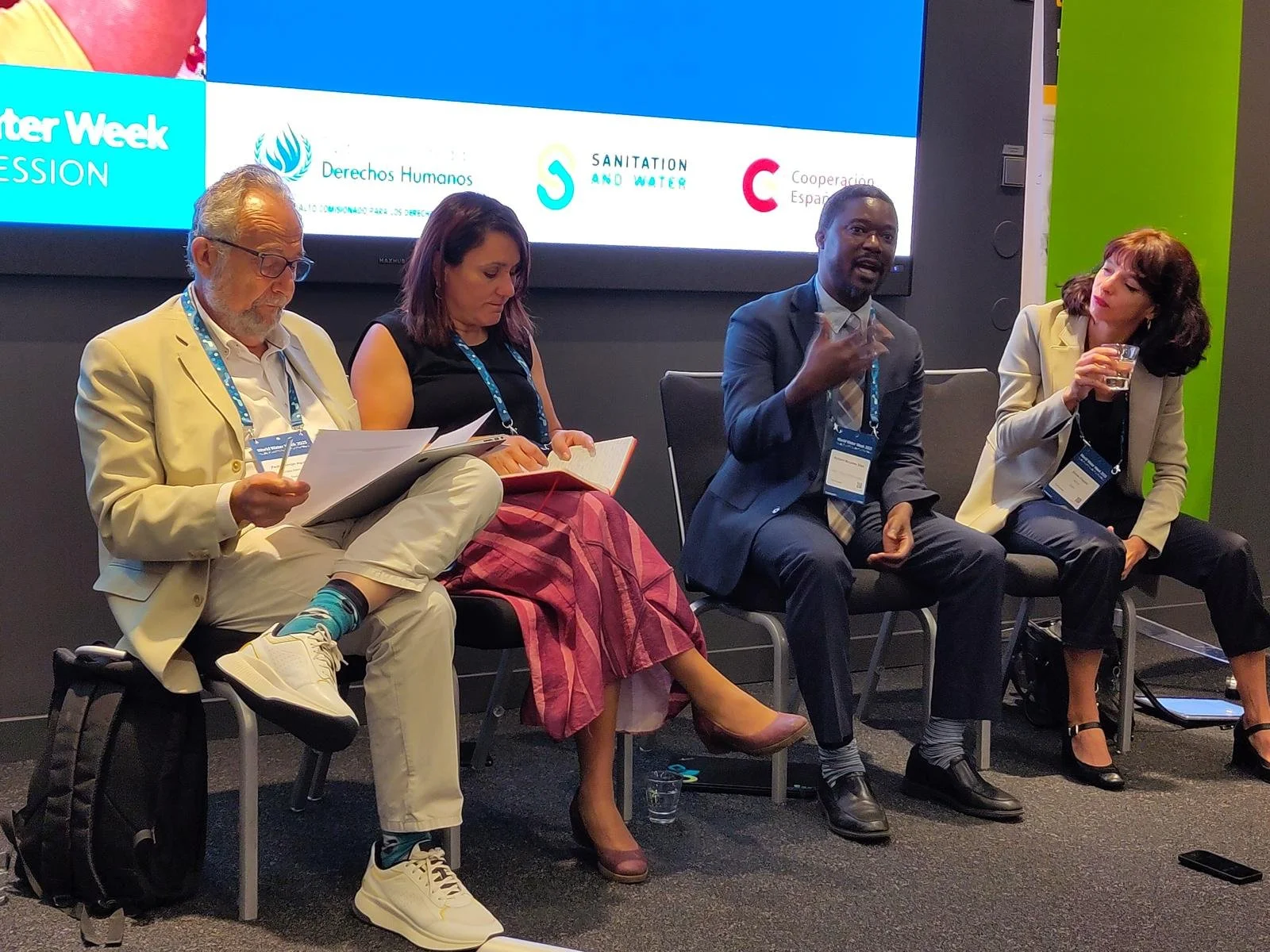Democratic Governance for Water and Sanitation: A Framework for Sustainable Service Delivery
UN Rapporteur on Water and Sanitation Pedro Arrojo-Agudo, Aurora Moreno Alcojor, AECID’s Emma Orejudo, and SWA’s Muyatwa Sitali at World Water Week.
SWA's Head of Country and Partner Engagement Muyatwa Sitali joined United Nations Special Rapporteur on Water and Sanitation Pedro Arrojo-Agudo and Spanish Cooperation Agency's Emma Orejudo at World Water Week to discuss democratic water governance and strategies to guarantee the human rights to water and sanitation. This is a summary of SWA's interventions.
Democratic governance in the water and sanitation sector requires coherence between planning, budgeting, and service delivery. SWA partners put together the framework that brought together four key components crucial to governance and achieving sustainable service delivery:
Government leadership and ownership
Developing and using national systems
Using information systems and being accountable
Building sustainable financing strategies.
SWA’s view of governance brings all those components together as well as governments and a broad range of development partners, civil society, research institutions, and the private sector in a mutual accountability framework. Additionally, Sanitation and Water For All promotes the human rights to water and sanitation, which mandates inclusive policy development, stakeholder participation, and non-discrimination.
Governance as well as service delivery can’t be done by a single actor alone. To do that well, we need to work together and be accountable to each other. Through our Mutual Accountability Mechanism (MAM), governments voluntarily define commitments and are supported and followed up by partners creating transparency, tracking, and shared responsibility for progress.
We’ve closely analyzed Nationally Determined Contributions (NDCs) and National Adaptation Plans (NAPs), especially through our 2024 policy brief (developed with SEI), which identifies key trends in sanitation integration. The analysis found growing recognition of the importance of water and sanitation, but often as a co-benefit rather than a central pillar of climate adaptation.
SWA has supported amplifying efforts to integrate resilient water and sanitation systems in climate policies (both NDCs and NAPs) for a number of developing countries. We are now part of the UNFCCC Technical Group that provides feedback to draft NAPs once countries are ready to share them. We also raise visibility of WASH in climate negotiations (see, for example, our efforts at COP 29), and provide technical support to negotiating parties, ensuring governments are aware of the synergies between governance reforms, resilience, and climate outcomes.
Our Theory of Change on climate action works across four pillars:
Global Influence: Advocating for resilient water and sanitation in global climate negotiations. One big achievement is securing a specific target for climate resilient water supply and sanitation within the Paris Agreement Global Goal on Adaptation.
National Alignment: Supporting countries to reflect these global frameworks and targets in national policies and investment plans, aligning efforts through the SWA Heads of State Initiatives.
Local Delivery: Focusing on resilient systems by supporting partners with technical tools like climate-resilient WASH definitions and indicators, and relying on the implementing capacity of our partners with presence “on the ground.”
Partnership Activation: The SWA Secretariat guides strategy, while partners lead the delivery, fostering multi-stakeholder leadership. We’re committed to a systems approach, ensuring that institutional governance and service delivery are aligned with the broader climate agenda.
SWA promotes multi-sectoral collaboration, a central theme for the upcoming 2025 Sector Ministers’ Meeting (SMM) in Madrid. The SMM will explore how ministers can integrate water supply and sanitation with water resources management and climate action, with a strong emphasis on sustainable financing models.
A key aspect is recognizing the value of participatory budgeting, transparency in financing, and ensuring community voices are included in decision-making and investment planning. Governments should prioritize inter-ministerial coordination, not only between water and sanitation actors, but also with ministries of finance, environment, health, and planning.
The High-Level Compact on Water Security and Resilience, to be launched at the SMM, will serve as a political commitment platform for these integrated actions, grounded in democratic governance principles.
Our work on realizing the human rights to water and sanitation is supported by the European Commission.



